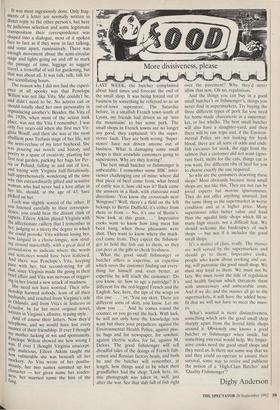More divisiveness, please I , •
about hard times and forecast the end of the small shop. It was being forced out of business by something he referred to as an out-of-town superstore. The Saturday before, in a smallish French town south of Lyons, my friends had driven us up 'into the mountains' to buy some pork. The small shops in French towns are no longer any good, they explained; it's the super- stores' fault. They are both wrong. 'Super- stores' have not driven anyone out of business. What is damaging some small shops is their erstwhile customers going to superstores. Why are they leaving?
The best small butcher or fishmonger is unbeatable. I remember some BBC inter- viewer challenging one of mine: where did that piece of beef come from, what breed of cattle was it, how old was it? Back came the answers in a flash, with elaborate road directions: 'You know the crossroads near Wingrave? Well, there's a field on the left belongs to Bertie Duffield, it's either from there or from — No, it's one of Bertie's. Now look at this grain.... ' Imperative cooks want to know how long meat has been hung, when those pheasants were shot. They want to know where the mack- erel came from. They expect the fishmon- ger to hold the fish out to them, so they can peer at the gills to check freshness.
What the good small fishmonger or butcher offers is expertise, an expertise which saves the customer finding out every- thing for himself and, even better, an expertise he will teach the customer: 'Do you know, sir, how to age a partridge? It's different for the red-legged French and the English. See, here, the tips of the wings on this one ... ' or, 'You say skirt. There are different sorts of skirt, you know. Let me show you ... ' And he comes round the counter, or you go out the back. With luck, he will not only have the knowledge you want but share your prejudices: against the Environmental Health Police, against plas- tic bags and for newspaper, for sawdust, against electric scales, for fat, against M. Delors. The good fishmonger will tell dreadful tales of the doings of French fish- ermen and Russian factory boats, and both he and the butcher will remember, at length, how things used to be when their grandfather had the shop: 'Look here, sir, this photograph was taken in, well, just after the war. See that slab full of fish right allow that now. Oh no, regulations.'
And the things you can buy in a good small butcher's or fishmonger's, things you never find in supermarkets. Try buying the three different types of pork fat you need for home-made charcuterie in a supermar- ket, or live whelks. The best small butcher will also have a slaughter-yard, and then there will be raw tripe and, if the Environ- mental Police are not looking for fresh blood, there are all sorts of odds and ends: fish carcasses for stock, the eggs from the salmon that a customer did not want (igno- rant fool), melts for the cats, things cut as you want, five different ribs of beef for you to choose exactly the one required.
So why are the customers deserting these shops? Most obviously because most small shops are not like this. They are not run by jovial experts but morose ignoramuses. They do not offer anything unusual, just the same thing as the supermarket in worse condition and at a higher price. Many superstores offer better value and food than the squalid little shops which fill so many high streets: not a difficult feat. We should welcome the bankruptcy of such shops — but not if it includes the good small shops.
It's a matter of class, really. The masses are well served by the supermarkets and should go to them. Imperative cooks, people who know about cooking and eat- ing, will patronise the good small shop. We must stay loyal to them. We must not be lazy. We must resist the tide of regulation and health fascism which threatens them with unnecessary and unbearable costs. And if we do, and the masses all go to the supermarkets, it will have the added bene- fit that we will not have to meet the mass- es.
What's wanted is more distinctiveness, something which sets the good small shop sharply apart from the horrid little shops around it. Obviously one knows a good butcher or fishmonger when inside, but something external would help. We Imper- ative cooks need the good small shops and they need us. Is there not some way that we and they could co-operate to ensure their survival, some way to revive and publicise the notion of a 'High-Class Butcher' and 'Quality Fishmonger'?
Digby Anderson


































































 Previous page
Previous page